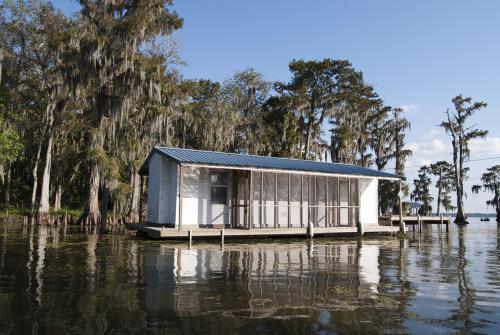
ByWater Institute Scholars
The ByWater Institute welcomes faculty, postdoctoral fellow, and research staff colleagues from across Tulane to join us as ByWater Institute Scholars. Our mission is to catalyze thriving climate and water futures through transformative & collaborative scholarship. A robust community of scholars at Tulane and beyond is key to achieving our goals.
ByWater Institute Scholar is an open membership level for Tulane affiliates interested in the research themes of the Institute. Scholars are invited to all institute-wide social and academic convenings. They are invited to seek guidance from the ByWater Institute on team building, proposal development, award management, and other aspects of interdisciplinary collaboration around environmental research. They can be part of an online database of faculty expertise hosted on our website so that others may seek them out for collaboration.
ByWater Institute Fellows
Tulane Faculty at any career stage are invited to help us grow our programs and impact by becoming ByWater Institute Fellows. We will award up to five (5) 3-year fellowships per year. Interested faculty should propose a project that is mutually beneficial to the faculty member and the Institute. Fellows will receive awards of $15,000 to complete their project and support their personal scholarship goals within the 3-year fellowship period. In addition to the monetary award, Institute Fellows will be invited to participate in events with university leaders and key funders, and they will receive in-depth support for proposal preparation and award management. The ByWater Institute website will be a platform for science communication for the fellows, and they will have opportunities for science communication training with experts in the field.
Current Fellows
Tiong Gim Aw
Tiong Aw, Ph.D., is a public health microbiologist and Associate Professor at Tulane University with diverse training background including environmental engineering, microbiology, virology and bioinformatics. His primary research areas are coastal water quality and the interactions among disease-causing microorganisms (pathogens) and their environment.
SunshineVan Bael
SunshineVan Bael is an Associate Professor in Tulane’s Department of Ecology and Evolutionary Biology. She is a community ecologist focused on understanding how plant-microbial symbioses influence plant resilience to stress in coastal and tropical areas. In the Gulf South, her lab has studied how vegetation, salinity, and water interact in urban, swamp, and marsh environments. An overall objective of the lab is to improve restoration outcomes through basic research on plant-microbial symbioses.
Liz Camuti
Liz Camuti, PLA, is a landscape architect and Assistant Professor at Tulane University. Her work focuses on design for climate adaptation, with an emphasis on reimagining working and highly engineered landscapes in the Gulf Coast region as sites of ecological cohabitation. Liz’s expertise is in visual storytelling and geospatial representation aimed at effectively communicating complex ecological, economic, and social systems to public audiences as part of an engaged design process.
Jeremy Jernegan
Jeremy Jernegan is a Professor in the Newcomb Art Department of Tulane University, where he has been ceramics area head since 1990 and is currently Associate Dean of Finance and Planning of the School of Liberal Arts. Jeremy’s current large-scale sculptural work consists of graphic wall pieces constructed from ceramic panels and stainless steel that investigate the relationship between two- and three-dimensional imagery.
Amalia Leguizamón
Amalia Leguizamón is an Associate Professor of Sociology at Tulane University. She is also a core faculty member at the Stone Center for Latin American Studies and a member of the Environmental Studies Faculty Advisory Committee. Dr. Leguizamón’s research work encompasses the political economy of the environment, with a regional focus on Latin America.
Adam Marcus
Adam Marcus is an Associate Professor of Architectuer at Tulane University School of Architecture. His work develops critical approaches to design computation, digital fabrication, and robotics, often exploring how these technologies can open up new modes of ecological, material, and public engagement. Prior to founding his own practice, he worked at Marble Fairbanks in New York City as project architect for a number of award-winning educational and public projects.
Laura McKinney
Laura McKinney is an Associate Professor of Sociology and Director of Environmental Studies at Tulane University. Her research focus is on international development, gender, and the environment. She received awards from the International Society for Justice Research in 2015 and the Barbara E. Moley Teaching Award in 2022. Dr. McKinney also serves as co-chair of our Community Advisory Board.
Larry Merington
Larry Merington is an accomplished C-level business executive with solid and progressive experience in all facets of executive leadership, operations management, change management, sales, and performance management in both domestic and international businesses. He is a business strategist with proven success in enhancing operational efficiency, streamlining business processes, leading organizations through critical transitions, and implementing cost control initiatives.
Annalisa Molini
Annalisa Molini is an Associate Professor in River-Coastal Science and Engineering at Tulane University. Her research focuses on the connections between hydrological cycle, vegetation, and climate, and she has expertise in stochastic hydrology, hydrometeorology, and land/vegetation-atmosphere interactions. She has served as an expert team member for COP26's “Visions for a Net Zero Future.”
Christopher Oliver
Christopher Oliver is a Senior Professor of Practice in both the Department of Sociology and the Environmental Studies Program at Tulane University. His past work has explored the consequences of energy policy, regulation, and legislation on federal, state, and local environmental policymaking. More recently he has been exploring issues of urban development (“gentrification”) as related to housing policy and economic development, and the location of public residential housing developments in proximity to environmentally polluted sites.
